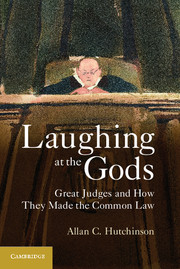4 - Oliver Wendell Holmes Jr.
The Magnificent Yankee
Published online by Cambridge University Press: 05 June 2012
Summary
Great figures have a tendency to polarize popular opinion. Acting as lightning rods for controversy, these characters hold strong opinions and express them forcefully. Their views and actions touch a nerve in the popular consciousness and galvanize both approval and disapproval. In many ways that is why they are great; this characteristic speaks as much to the intensity of their sway as it does to their merit. They manage to occupy a position that stands on the fringes of received views but strikes at the heart of the times. Sometimes unappreciated in their own lifetimes and occasionally vilified, their influence casts a long shadow and is the stuff of debate for many years to come.
Oliver Wendell Holmes is one of those figures. It is no exaggeration to say that this magnificent Yankee stands as a colossus astride the American legal system and still manages to exert a strong pull on today's judging and its theoretical basis generally. With his imposing demeanor and his enviable ability to turn a phrase, he is that rare entity whose legacy can be challenged but not ignored. He possessed a capacity to crystallize sharply the emerging viewpoints on a topic and to shape them into a new way of thinking. He was not only a fund of penetrating questions but also a resource of provocative answers. Over his long and varied career, he became an iconic presence on the academic and judicial scene. Few others can claim to have made such an impression, both good and bad, on the minds of lawyers and jurists. He is the law's Jekyll and Hyde.
- Type
- Chapter
- Information
- Laughing at the GodsGreat Judges and How They Made the Common Law, pp. 81 - 110Publisher: Cambridge University PressPrint publication year: 2012



